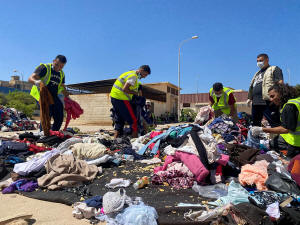|
A
torrent washed away whole districts of Derna, a city in eastern
Libya, on Sunday night after two dams collapsed. Thousands were
killed and thousands more are missing.
"We urge authorities in communities touched by tragedy to not
rush forward with mass burials or mass cremations," said Dr
Kazunobu Kojima, medical officer for biosafety and biosecurity
in the WHO's Health Emergencies Program, in a joint statement
sent out by the U.N. health agency with the International
Committee of the Red Cross (ICRC)and the International
Federation of the Red Cross and Red Crescent Societies.
The statement called for better managed burials in well
demarcated and documented individual graves, saying that hasty
burials can lead to long-lasting mental distress for family
members as well as social and legal problems.
The bodies of victims of trauma from natural disasters "almost
never" pose a health threat, it added, saying the exception was
when they were in or near fresh water supplies since bodies may
leak feces.
A U.N. report published on Thursday said that over 1,000 bodies
in Derna and over 100 bodies in Albayda had been buried in mass
graves after the floods on Sept. 11.
"Bodies are littering the streets, washing back on shore and are
buried under collapsed buildings and debris. In just two hours,
one of my colleagues counted over 200 bodies on the beach near
Derna," Bilal Sablouh, Regional Forensics Manager for Africa for
the ICRC, told a Geneva briefing.
The ICRC has sent over a cargo flight to Benghazi on Friday with
5,000 body bags, he added. He warned that unexploded ordnances,
common in some parts of Libya, posed a risk for those involved
in recovering the dead.
(Reporting by Emma FargeEditing by Miranda Murray and Mark
Potter)
[© 2023 Thomson Reuters. All rights
reserved.] Copyright 2022 Reuters. All rights reserved. This material may not be published,
broadcast, rewritten or redistributed.
Thompson Reuters is solely responsible for this content.

|
|




